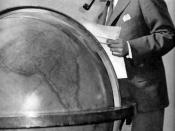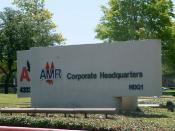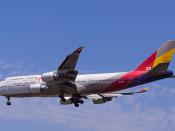9-11
In the 6 years preceding 9/11, during what is undoubtedly a boom period for the economy, the industry earned a mere 3.5% net profit compared to an average of 11.5% for the S&P 500. In the wake of the events of September 11th, the industry's problems are brought to the forefront. Both, business and leisure travelers have avoided air travel or moved to low-cost flights. Airlines have been particularly hard hit by the fall in business travel, on which they rely for roughly two-thirds of their revenues. American carriers reduced their carrying capacity by 15-20% in anticipation of the collapse in passenger traffic. However, with Continental for example, a 20% reduction of flights led to only a 12% reduction in costs.
As stocks plummeted, most of the major airlines announced massive layoffs, reduced capacity and lobbied for a government bailout. The Congress approved a $15 billion bailout in September 2001, of which the $5 billion cash bailout served only to stem short-term losses that were the immediate consequence of airport shutdowns around the country.
Despite this, there were a series of bankruptcies led by US Airways in August 2002. The bankruptcies have caused greater concern about air travel. Travelers are weary of buying a ticket on an airline that looks like it may go bankrupt, for fear of losing money and being left stranded in the event that it does.
The years following showed a further decline in performance. The U.S. Department of Transportation's Bureau of Transportation Statistics reported that among US airlines that reported traffic data, there were 6.4% fewer passengers during the first half of 2003 compared to that of 2001. Between 2002 and 2003 however, there was an improvement of 1.1% in traffic.
To avoid a repeat of 9/11, strict security measures have been introduced which...



Terrorism
this is a sure B+ essay, it could use some umph, some passion, or pazazz. but good essay alltogether
3 out of 3 people found this comment useful.